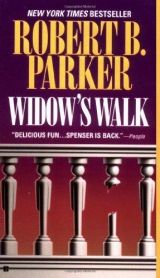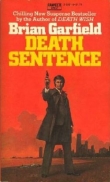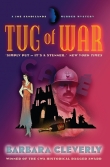
Текст книги "Widow’s Walk"
Автор книги: Robert B. Parker
Жанр:
Крутой детектив
сообщить о нарушении
Текущая страница: 12 (всего у книги 13 страниц)
CHAPTER FIFTY-SIX
I sat with Vinnie Morris in my car parked on the second level of a parking garage beside a hotel in downtown Worcester, near the Centrum. Almost everything in downtown Worcester was near the Centrum.
“She drove out here this morning with an overnight case,” Vinnie said. “Checked in a little after one.”
“Alone?”
“Alone.”
“You see any sign of Conroy?”
“Nope.”
I looked at the dashboard clock. It was 2:47. I didn’t like digital clocks. Nice phrases like quarter to three were becoming obsolete.
“You’d recognize him?”
“Yep.”
“He ever make you when you tailed him before?”
“Nope.”
“Okay,” I said. “I’ll hang here. They’d both know me. You go to the lobby and sit around and try to look like a hotel guest.”
“I’ll read a newspaper,” Vinnie said.
“Master of disguise,” I said. “If she goes out, follow her. If Conroy comes in, follow him. Find out what room he goes to. You got a cell phone?”
“Yep.”
I took out a business card and wrote my car-phone number on it and gave it to Vinnie.
“If they get together, stay with them and call me.”
“Okay.”
Vinnie got out and walked toward the stairwell. He moved very precisely. As if he’d been expertly crafted. He was medium-sized and liked Ivy League clothes. Except for the way he moved, he didn’t look anywhere near as dangerous as he was. I let the motor idle so the car phone would work, and punched in a number. My status was rising. I got right through to Bobby Kiley.
“Your daughter has checked into a hotel in Worcester with an overnight bag,” I said. “I’m waiting for Marvin Conroy to show.”
“Which hotel,” Kiley said.
I told him.
“I’ll be there in an hour,” he said.
“I don’t want Conroy spooked,” I said. “There’s a hydrant across the street from the main lobby entrance. Park there and wait for me to find you. What are you driving?”
“Black Lexus sedan,” Kiley said. “Vanity plates-Like-A-Will-More-A-N.”
“It’ll be me, or a guy named Vinnie Morris, who’s almost as good as me.”
“I’ll be there,” Kiley said. “Thanks.”
We hung up. I couldn’t find anything on the radio that was recognizably musical. I did not want to listen to the opinions expressed on the talk shows. I didn’t want to tie up my car phone, so I couldn’t call Susan up. When all else fails, think about the case.
I still didn’t know exactly what was happening. The business about taking the gun so it would look like murder was just the kind of smart move a couple of morons like Mary Smith and Roy Levesque would choose. The fact that the finger of suspicion would then point at Mary, his heir, would never have occurred to them. Or it could be a double fake to cover up the fact that they really had killed him and Roy was too dumb to get rid of the gun.
But I did know that the only connection between what seemed like two separate cases, but probably wasn’t, was Marvin Conroy. He was connected through the bank to the Smiths and Soldiers Field Development and that side. He was connected through Ann Kiley to Jack DeRosa and Chuckie Scanlan and that whole side, where people were getting killed. If I believed Bisbee, and there was no reason not to, Conroy and Soldiers Field and Pequod Bank were involved in some kind of swindle. The need for an inflated appraisal made me wonder if it was a land flip. But in wondering that, I exhausted my expertise. Rita would know. Or she would have somebody in the firm who would know.
At 4:53 my car phone rang.
“I’m on the seventh floor,” Vinnie said. “She’s in room 7112. He’s in there with her.”
“Here I come,” I said.
As I headed for the stairs to the lobby I looked down and saw Bobby Kiley’s Lexus. When I got to the seventh floor, Vinnie was standing outside the elevator, looking like a man waiting to go down.
“Turn right,” Vinnie said. “Halfway down the corridor.”
“He wonder about you when you rode up with him?”
“Maybe. But what’s he going to do?”
I nodded.
“How you going to get in?” Vinnie said.
“Maybe I’ll knock on the door, like in the movies, tell him there’s a message?”
Vinnie grinned. “And he says slip it under the door.”
“And I say he’s got to sign for it.”
“And the dope jumps up and opens the door.”
“Or he tells me to blow,” I said. “Especially if nobody knows he’s here and how could they send him a message.”
“Always works in the movies,” Vinnie said.
“I can take it from here,” I said to Vinnie.
“You don’t want me to shoot nobody?”
“Thank you for asking,” I said. “Another time.”
“Sure.”
“Guy named Bobby Kiley is parked across the street from the lobby entrance in a black Lexus sedan, vanity plates say ”Lawman.“ Send him up and tell him I’ll be outside the room or in it.”
“Kiley,” Vinnie said.
“Girl’s father,” I said.
Vinnie nodded. He pushed the button for the elevator. The door slid open. The same car I’d come up in was still there. Vinnie got in, pushed the button for the lobby, and the door slid shut. I walked down the hall to room 7112 and stood opposite the door and leaned on the wall and waited. I was still there when Bobby Kiley came down the corridor.
“Is he in there?” Kiley said.
“Yes.”
“Have you knocked?”
“I was waiting for you.”
Bobby Kiley took a deep breath and let it out slowly through his nose.
“I’ll knock,” he said.
CHAPTER FIFTY-SEVEN
It was probably two full minutes, and Kiley had knocked three times when Ann opened the door with the chain on.
“Daddy?”
“Open up, Ann,” Kiley said. “We need to talk.”
“Daddy, not now.”
“Now, honey.”
Through the narrow space produced by the barely opened door I could see Ann Kiley’s eyes shift briefly to me, and back to her father.
“Daddy, I’m busy.”
“I know,” Kiley said. “And I know who you’re busy with. Open the door, Annie.”
“Daddy,” she said, emphasizing the two syllables, stretching out the second one.
“Annie, you’re a full-grown woman. Who you sleep with, and how often, is your business and not mine. But we’re dealing with four or five murders here… and you’re involved, and I am going to get you uninvolved. If we have to kick this thing in, we will.”
I think he meant that I would. But it was not a time for quibbling over pronouns.
“I have to close it to take the chain off,” Ann said.
Kiley nodded. The door closed. The chain bolt slid. The door opened and we went in. Ann was wearing a hotel-issue white terrycloth bathrobe. Her hair was mussed. Her clothes were haphazardly draped on the hard chair in front of the desk by the window. On the desk was a bottle of champagne and two glasses. The king-sized bed was still made, but it was badly rumpled and the pillows had been pulled out from under the spread. There was no one else in the room. But a man’s clothes were carelessly folded on the armchair to the right of the door. I walked to the bathroom and opened the door. Marvin Conroy was standing behind the pebbled glass door in the shower stall with only his pants on, the belt still unbuckled.
“Who would think to look here,” I said and held the shower door.
It is hard to look dignified when you’re caught hiding in the shower with your pants unbuckled. Conroy did his best as he came out of the bathroom, but it didn’t seem to me that he succeeded. He buckled his pants as inconspicuously as he could, and stepped into the brown loafers with the black highlights, which he had left neatly at the foot of the bed. Shirtless, he looked kind of soft, not fat exactly, but like a guy who makes his living shuffling money. I could tell he was holding his stomach in. He saw his shirt hanging on one arm of the soft chair and retrieved it and put it on, though he didn’t tuck it in. As he dressed, he rejuvenated. By the time his shirt was buttoned he was nearly back to bank CEO. Ann sat on the side of the bed without a word. Her head was down, and she looked at nothing.
“Bobby,” Conroy said. “What the hell are you doing?”
Kiley didn’t say anything. He went to the bed and sat beside his daughter. Conroy fumbled with his cuff links. He turned his gaze from Kiley and focused it on me.
“And what the hell are you doing here?” he said.
He was getting tougher by the minute. By the time his cuff links were in he’d be threatening me. I leaned against the door.
“Here’s what I’ve got,” I said. “I know you were looking into Nathan Smith’s sexual preferences.”
“What the fuck are you talking about?” Conroy said.
“And I know you had Jack DeRosa hire a couple of mulligans to beat up a real estate appraiser named Bisbee to make sure he didn’t tell anybody that you were asking him to inflate appraisals. And I know you got Jack DeRosa from Ann Kiley, and I know you got Ann to go down and straighten things out when the mulligans got arrested. And I know that you were in business with Soldiers Field Development, and I’m pretty sure I can prove that you were involved in some sort of land flip with them. You worked with Amy Peters. She’s dead. You worked with Jack DeRosa. He’s dead. You were snooping on Nathan Smith. He’s dead. Sooner or later I’ll tie you to Brinkman Tyler.”
I stopped. Conroy was silent. I didn’t blame him. There was a lot coming down. He didn’t say, “Who’s Brinkman Tyler,” and he probably should have. After a moment, he stood.
“I’m leaving,” he said firmly.
I shook my head. “No,” I said. “You’re not.”
“Are you saying you’ll prevent me?”
“Yes.”
He stared at me, trying for outrage. He fell a little short. He was thinking about whether he could force me to let him go, and deciding that he couldn’t. He was correct.
“You can’t-”
“Sure I can,” I said. “What we’re trying to decide here is how much we can keep her out of it.”
For the first time since he’d come out of the bathroom, Conroy looked at Ann.
“There’s no it to keep anybody out of,” Conroy said. “You haven’t got anything worth listening to.”
“What do you think?” I said to Ann.
Still staring emptily at nothing, she shook her head.
“You haven’t any right,” she said without looking up. “Neither of you has any right.”
“I can’t help you if I don’t know what I’m doing,” I said. “Tell me what you know.”
“I know I love Marvin,” she said.
Seated beside her Kiley closed his eyes for a moment and stretched his neck a little.
“Anyone would,” I said. “But are you ready to go to jail with him?”
“If I have to.”
“How far out of this can we keep her,” Kiley said to me.
“Depends how far in she is,” I said. “Much of what I said about Conroy could be said about your daughter.”
It was a gamble. But Kiley was a smart guy, and very tough, and if he picked up on it maybe we’d have something.
“You’re saying if you can’t get him you’ll get her?” Kiley said.
He got it. I wanted to go over and sit in his lap.
“Would work either way,” I said.
“You said we could work something out.”
“We can, with one of them, but not both, and to tell you the truth, Bobby, I don’t especially care which one it is. Hell, it works for me if they both go.”
Kiley put an arm around his daughter’s shoulders. She seemed to contract in a bit on herself when he did it. Her head was still down.
“Honey,” Bobby Kiley said. “Tell us what you know.”
She shook her head. Kiley looked at Conroy.
“How about you?”
“I have nothing to say.”
“For God’s sake, man. I’ve been in criminal law all my life. They’ve got enough. This guy will get you. I know this guy. You don’t. He’ll bring you down, and if you don’t help her, my daughter will go with you.”
Conroy was silent. He looked at me leaning against the door.
“You tell me what I need,” I said, “and I can keep her out of it.”
“You and I both love her,” Kiley said. “We can’t let this happen to her.”
Conroy walked to the window and stared through it at the shabby cityscape below him. For the first time since we’d come into the room, Ann Kiley raised her head. Her father’s arm still around her, she looked at Conroy. He kept looking out the window. Then, as if he could feel her look, he turned back toward us. None of us said anything. He looked at Ann Kiley. After a long moment Conroy nodded his head.
“Okay,” he said.
CHAPTER FIFTY-EIGHT
“I didn’t kill anybody,” Conroy said.
“You just had it done,” I said.
“No. That was Shawcross.”
“He had it done?”
“Yeah.”
The gloss of Conroy’s CEO manner was sloughing off rapidly.
“You were just the middleman,” I said.
Conroy shrugged. “I worked for Felton Shawcross,” he said.
He was sitting on the edge of the hard chair, his forearms on his thighs, his hands clasped between his knees. Ann Kiley, still in the hotel bathrobe, sat on the bed. Bobby Kiley sat beside her.
“We were working a loan-to-value scam on Pequod,” Conroy said. “You need me to explain that?”
I looked at Bobby Kiley.
“I know what a loan-to-value scam is,” Kiley said.
“Later,” I said.
“Good,” Conroy said. “Smith didn’t like it, but we knew he was gay, and we knew he was hiding it. So we squeezed him.”
“Which is how you got to be president of Pequod,” I said.
“Yeah. Smith was chairman, but that was just for show. He did what we told him.”
“And?” I said.
“And we were making a fucking fortune,” Conroy said.
“But?”
“But Smith wouldn’t stay squeezed. He finally said if we didn’t move on and let go of his bank he’d go to the cops.”
“So?”
“So Shawcross had him killed, and rigged it to look like a suicide. But somebody fucked it up.”
“Mrs. Smith,” I said. “She thought it was suicide and didn’t want to forfeit her insurance and decided to make it look like a murder.”
“Which it was,” Bobby Kiley said.
Conroy shook his head, thinking about it.
“Ain’t that great,” he said. “And we didn’t know why the suicide setup went wrong, but it did and we had to go to plan B.”
“Which was to frame Mary Smith for the murder.”
“Yeah.”
Conroy looked at Ann Kiley again. She looked back at him. Something went on between them for a moment. I waited for it to stop.
Then I said, “What about Amy Peters?”
“That was bad,” he said. “She told me she’d talked to you, asked if there was anything going on she should know about. Said she could serve the bank better if she knew what was up so she wouldn’t be blsided.”
“Good employee,” I said.
“Yeah. She was very career-driven,” Conroy said. “I mentioned it to Felton and that was it for her.”
“Just for asking?” Ann said.
Conroy looked at her again for a moment.
“Felton is a really smart guy,” Conroy said. “But he’s… he’s like Stalin or somebody. Any suspicion, you’re dead.”
“Must have been fun to work for,” I said. “What happened to Brink Tyler.”
“I don’t know. I mean, I know Felton had him zipped, but I never knew what for. Maybe Smith talked to him about his situation-you know, had a problem related to money, so he talked with his broker? Guys like Smith sometimes don’t have anyone else to talk to.”
“How about guys like you?” I said.
“I had Ann,” he said. “Maybe Tyler decided to cut himself in, whatever. He knew something, so Felton had him killed.”
“Who’s doing all this killing?” Bobby Kiley said.
“We recruited local guys.”
“How?” I said.
“Through DeRosa. They never knew who they were working for.”
“Would Shawcross kill someone himself if he had to?” I said.
“Sure.”
“DeRosa was a valuable man,” I said. “Why waste him on the Mary Smith frame?”
“He was in jail anyway,” Conroy said. “Small-time street thing, the asshole. We got it fixed. But meanwhile, it gave him a reason to make a deal with the DA for ratting out Mary Smith.”
“Credibility,” I said. “Who were the stumblebums that followed me around and tried to brace me in the parking garage?”
“They were from Felton. He had some people on, ah, staff.”
“But he didn’t use them for heavy lifting?”
“No,” Conroy said. “Not usually. He wanted to keep that separate. Anybody who did any killing only knew DeRosa.”
“That true of the guys that tried me in Fort Point?”
“Yes.”
“Who pulled the trigger on DeRosa?”
“I don’t know. Maybe Felton.”
“Because I was getting too close?”
“I don’t know how close you were getting,” Conroy said, “but you wouldn’t go away. Killing you hadn’t worked, so he had DeRosa killed to cut you off, and he told me to disappear.”
“Which you did.”
“Yeah.”
“Except.” I looked at Ann.
Conroy nodded. His voice was heavy. “Yeah,” he said. “And you figured it out.”
“Why were you checking Smith out at the gay clubs?” I said.
“You know about that, too,” Conroy said wearily.
“We never sleep,” I said.
“I was trying to figure out what Shawcross had on him. I got some sort of gay hit off him in the bank. All those boys… I don’t know. I just had a suspicion.”
“How did Shawcross know?”
“I don’t know.”
“The name Roy Levesque mean anything?” I said.
“No.”
“Larson Graff?”
“No.”
“How about Joey Bucci?” I said.
Conroy frowned. “Bucci?”
“Yeah.”
“When I was at the bank we lent him some money.”
“You remember all the bank loans?” I said.
“No. This one was no interest, open-ended, you know? A gift. Felton told us to do it.”
“You know why?”
Conroy shook his head.
“You know where Shawcross is now?”
“No idea.”
“Is that his real name.”
“No idea.”
“Will he come after you when he knows you’re talking like this?” Ann said.
“What fucking difference does it make, Annie?” Conroy said.
Tears formed in Ann Kiley’s eyes. Beside her Bobby Kiley’s face was pale and bony. He put his hand on his daughter’s shoulder. She didn’t appear to notice.
“Shawcross has disappeared,” I said. “We don’t know where he is. We don’t even know who he is. He’s safe. Reaching back here for Conroy is a risk that doesn’t make any sense.”
Conroy shrugged.
“We can keep Ann out of it,” Kiley said. “He makes a couple of minor adjustments, which we can help him with, Annie’s name never has to come up.”
“You okay with that?” I said to Conroy.
He nodded.
“You?” Bobby Kiley said to me.
“Yeah,” I said. “I’m all right with that.”
CHAPTER FIFTY-NINE
Abner Grove wore a blue polo shirt and tan slacks, loafers with no socks.
“Casual day?” I said.
Grove smiled. “Every day,” he said.
I looked at Rita.
“Abner’s so good,” Rita said, “he can get away with pretty much anything he wants to.”
“He married?” I said.
“Sadly yes,” Rita said.
Grove waited patiently while we discussed him.
Then he said, “A loan to value is one where the bank assumes all risk. I don’t know the details yet of what Soldiers Field and Pequod were doing. It will take years to peel all that away. But here’s how an LTV can work.”
“LTV?” I said.
“Loan to value,” Grove said. There was a hint of scorn in his voice.
“That’s right,” I said.
Grove frowned for a minute, then went on, as if I hadn’t teased him.
“I don’t want to keep saying Soldiers Field Development every time,” Grove said, “so we’ll call them Soldier, and we’ll call the bank Pequod. Soldier has some property it wishes, or appears to wish, to develop. It borrows say fifty thousand dollars from Pequod and buys the land. It then flips it.”
“That is, sells it back and forth,” I said. “With somebody in on the deal.”
“Yes. Each time inflating the cost and getting a new loan from Pequod to cover it.”
“Doesn’t the bank get suspicious?” I said.
“Of course,” Grove said. “Finally, let’s say, Soldier has now inflated the value of this property to a million dollars, and it’s quote unquote owned by their flipping partner. Soldier goes to Pequod for an ADC loan.”
“Which would be?” I said.
“Acquisition, development, and construction. They get a loan to value-which is to say that the loan covers all costs, including fees and even interest on the loan for the first two years. There is no down payment.”
“I’m beginning to see how this might work out,” I said.
“After a time, Soldier defaults on the loan, government insurance covers the loss, and everybody makes a lot of money.”
“Doesn’t the government catch on after a while?”
“Sometimes. Sometimes Pequod might sell the loan to a sister institution, which gets it off Pequod’s books, so that when it defaults it defaults on the sister bank.”
“And what’s the sister bank get out of that?” I said.
Grove smiled. “Reciprocity,” he said.
I looked at Rita. She was wearing a bright green suit today, long jacket, short shirt. Her hair was gleaming. She was leaning back in her chair with her spectacular legs crossed, one foot swinging gently. Her shoes were black.
“Talk a little about interest rates,” Rita said to Grove.
“One of the things a bank will do, obviously, to attract depositors is to pay high interest rates. But if you pay too much interest you can’t make a profit.”
“You have to charge more interest than you pay,” I said.
“There you go,” Grove said. “You’ll make a banker yet. Pequod paid the highest interest in the area. Significantly higher. Possibly because they were not worried about profit.”
“Because they were simply Soldier’s vehicle for fraud,” I said.
“Yes.”
“Would the president of Pequod have to know?”
“Almost certainly,” Grove said. “But that said, once you got your own man in there…”
“Conroy,” I said.
He nodded. “Then, while he would know what was going on, he wouldn’t have to be involved. He could just get out of the way and let Conroy run the scam.”
“How much money are we talking about?” I said.
Grove shrugged, put his head back, pursed his lips, and thought about it.
“A hundred million dollars would not be out of the question,” he said.
Rita said, “Jesus Christ!”
“People have been killed for less,” I said.
“Mind you, this is all hypothetical,” Grove said. “We may never prove any of it.”
“We’re not compelled to prove any of it, About,” Rita said. “We’re only on the hook for defending Mary Smith.”
“That would be your area,” Grove said.
“It would,” Rita said.
“You have questions,” Grove said, “feel free to call me.”
“I’ll have questions,” I said.
Grove nodded, still with a hint of scorn, and went out.
“Grove know his stuff?” I said.
“He knows everything there is to know about finance law. He knows almost nothing about anything else.”
“Turned you down?”
Rita smiled. “Dumb bastard,” she said.
Rita and I looked at each other for a moment.
Rita waggled her knees at me.
“Remember that scene with Sharon Stone?” Rita said.
“Don’t start with me, Rita. You know how excitable I am.”
“I’ve always wanted to see you excited,” she said.
I had nothing really good to say to that so I didn’t say anything.
“I guess we’ve got Mary Smith out of the deep water,” I said.
“She did try to conceal a murder,” Rita said.
“Well, did she,” I said. “She set out to conceal a suicide.”
“By pretending it was a murder.” Rita smiled. “Which in fact it was,” she said. “I think we can reason with Owen Brooks about that.”
She swung her foot some more, watching as it moved in a small arc. She smiled at me again.
“You know,” she said, “Owen’s single again.”
“A single DA,” I said. “What could be better?”
“You think Mary knew anything about the bank-fraud enterprise?” Rita said. Sex and business were two sides of the same thing to Rita.
“I haven’t come across any sign of it,” I said.
“The murder was the only overlap.”
“Far as I can see, except for Graff…!”
“What?” Rita said.
“Graff. Graff is the only person left standing that could connect Shawcross to the bank fraud and the murders.”
“What about Conroy?”
“Shawcross thinks Conroy is waiting for him in Wamego, Kansas,” I said. “Under another name. In another bank.”
“And Graff is connected to them?”
“The bank lent him money, interest-free,” I said. “He used his original name, Joey Bucci.”
“A gift.”
“Yep.”
“He did something for Shawcross,” Rita said.
“You’d think so.”
“And with Conroy, Shawcross assumes, still his partner and already laying groundwork for a new fraud…”
“Leaves Graff the only loose end I know about.”
Again Rita and I looked at each other.
“I think I better go visit Larson,” I said.
“Six people have been killed so far,” Rita said.
“Let’s see if we can hold it at six,” I said.
“Be a little careful,” Rita said. “I haven’t slept with you yet.”








